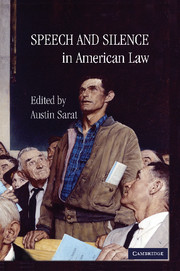Book contents
- Frontmatter
- Contents
- Contributors
- Acknowledgments
- Introduction: Situating Speech and Silence
- 1 “Our Word Is Our Bond”
- 2 Powell's Choice: The Law and Morality of Speech, Silence, and Resignation by High Government Officials
- 3 Anonymous: On Silence and the Public Sphere
- 4 Freedom of Expression, Political Fraud, and the Dilemma of Anonymity
- 5 Speech, Silence, the Body
- Index
- References
2 - Powell's Choice: The Law and Morality of Speech, Silence, and Resignation by High Government Officials
Published online by Cambridge University Press: 04 August 2010
- Frontmatter
- Contents
- Contributors
- Acknowledgments
- Introduction: Situating Speech and Silence
- 1 “Our Word Is Our Bond”
- 2 Powell's Choice: The Law and Morality of Speech, Silence, and Resignation by High Government Officials
- 3 Anonymous: On Silence and the Public Sphere
- 4 Freedom of Expression, Political Fraud, and the Dilemma of Anonymity
- 5 Speech, Silence, the Body
- Index
- References
Summary
Suppose that you were Colin Powell. A bit of a stretch, I admit, but give me my counterfactual for the moment. Would you have resigned your office rather than go before the United Nations Security Council to make the case for the invasion of Iraq? Or would you have remained silent, swallowed your doubts and, like a good soldier, obeyed your orders?
One problem with the counterfactual is that it is very hard to know what Colin Powell is like or what the world seems like to him. It is even harder – indeed, perhaps incoherent – to suppose some indeterminate mix of you and Colin Powell that a question in the form of what “you” would do if “you” were “Colin Powell” seems to demand. I will return to these difficulties later in this essay. For now, though, suppose that you were an idealized and radically simplified Colin Powell – a Colin Powell who was fully aware of the criminal idiocy of the impending Iraq adventure and who simply wanted to do the right thing. Then, would you have resigned?
In their classic study of resignation, Edward Weisband and Thomas M. Franck lament the historic failure of American officials to resign in protest. Very few Americans have publicly resigned because of policy disagreement, and those who have were often treated unkindly by their contemporaries.
- Type
- Chapter
- Information
- Speech and Silence in American Law , pp. 48 - 82Publisher: Cambridge University PressPrint publication year: 2010



